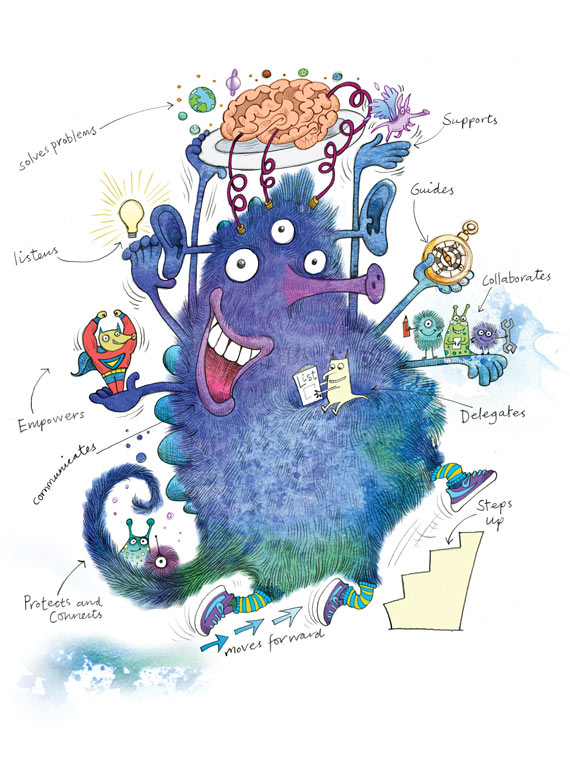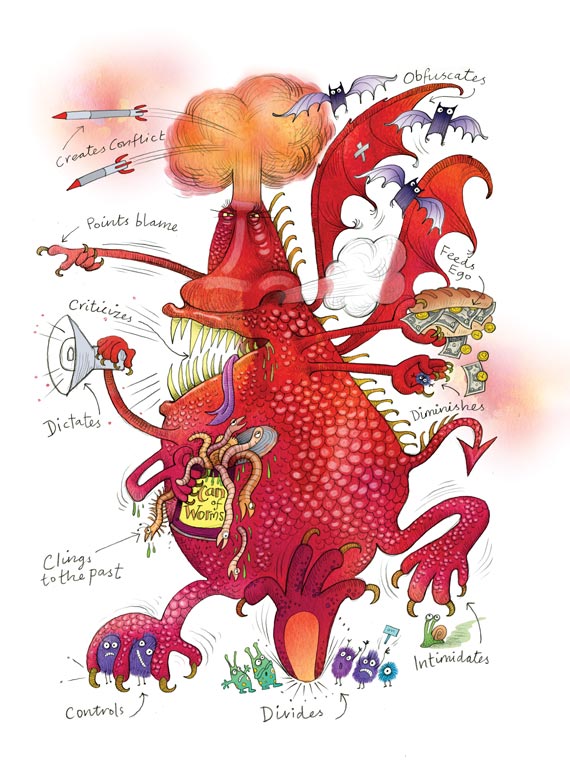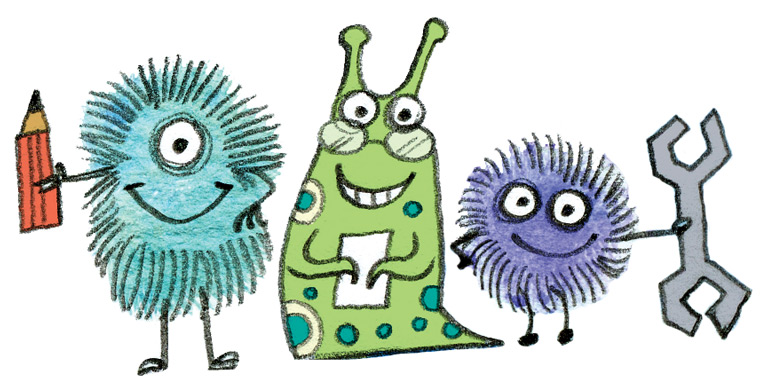If you want to spark a lively conversation, just ask SLC students about the nature of leadership—especially in the context of current global politics. We did just that, and the traits they attributed to the best and the worst leaders ranged from sensitive and receptive to tone deaf and closed-minded, from humble and confident to self-centered and insecure, from condescending and rigid to encouraging and flexible.
A Good Leader
Click image to enlarge
A Bad Leader
Click image to enlarge
Three Student Leaders Featured
The observations of three student leaders inspired these marvelous beasts, which embody the good, the bad, and the sometimes downright ugly traits leaders can display.
Hagerah Malik ’18

Hagerah Malik ’18 conducted lab research in molecular biology with Drew Cressman (biology) this summer, and she also worked with SLC’s Summer Connections with Refugees and Immigrants Program. In the spring, she’ll continue to co-chair the Health and Science After-School Program for children in Tuckahoe, leading the student-organized partnership with a community-based agency.
“Leaders shouldn’t be concerned about furthering themselves, but about helping others further themselves. Leadership is not about the leader.”
Hagerah’s Thoughts on Leadership
A leader is somebody people can look to, somebody who guides them—not somebody who tells you when, how, and what to do, but helps you figure out how to do it yourself. Leadership is about helping others find within themselves the capacity to accomplish a task or goal, to succeed. That’s the ideal.
A good leader has the ability to connect with people by understanding them not just in a professional sense, but also a personal one, knowing what their concerns are and playing up their strengths while building up their weaknesses.
The ability to listen is one of the most important traits. When we start listening, we start to understand what others’ concerns are. Even if you don’t achieve your goal, people have greater respect for a leader who listens.
In my first year of college, I met a senior who worked in the lab I work in now. She was involved in lots of amazing things, including leading volunteers at a clinic. She went out of her way to help me find opportunities I could learn from and gave me a lot of good advice. She pushed me to not accept where I was, but to seek out everything I could do to make the most of myself. I loved her willingness to encourage me to find these opportunities and go after them.
On the other hand, I once knew a person who thought she was very special to have been selected for a leadership position, like she was entitled to it. She came across as condescending, and couldn’t see that people have different strengths. All of this made my experience working with her less than ideal. She didn’t respect us or our strengths, and didn’t help us grow. She made everything about herself.
When I started working in the science lab, my professor set it up in a way that pushed everybody to figure out their own problems. You’d never get a straight answer from him! He’d ask how you could work to get the answer yourself using the information you had. I’ve adopted that approach myself as a leader. When someone needs help, I never just give them the answer or do it for them. I say: “Okay, you know XYZ. How can you take the next steps to figure this out?” Even if it takes longer to get the thing done, it’s better because people develop a better understanding of problems and solutions this way.
I’ve never seen myself as a leader, but if you put in the time and effort, one day you find you’re in a leadership role. But that doesn’t change how I approach the activity. There’s the added responsibility of making sure people are learning and having fun, but I never think, “I’m being a leader right now.” I just try to treat everyone as an equal and try to figure out how I can best help them. I’ll also stop halfway through the semester, sit down with people, and say, “What can I do better? How can I be more helpful?” It’s hard to evaluate yourself and your actions. It’s hard to be unbiased. Others often have better insights.
Leaders shouldn’t be concerned about furthering themselves, but about helping others further themselves. Leadership is not about the leader.
Zack Roccaforte ’19
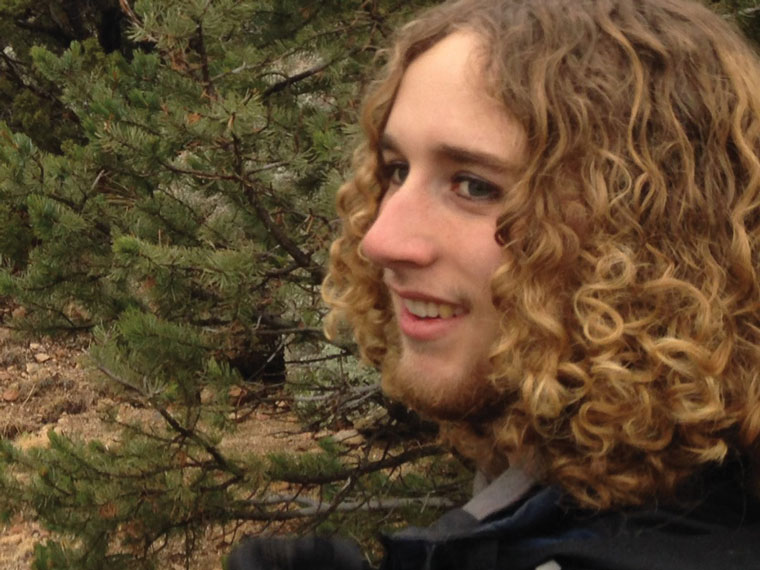
Zack Roccaforte ’19 worked at the Center for the Urban River at Beczak (CURB) this summer through the Community Leadership Intern Program as well as SLC’s Summer Connections with Refugees and Immigrants Program. During the academic year, he took part in a student-led initiative with the International Rescue Committee for his service-learning class with Janet Reilly (politics) while also competing on the Gryphons cross country and volleyball teams.
“A good leader should be able to eliminate fear in others. … I want to make people feel safe, especially when they’re doing something new.”
Zack’s Thoughts on Leadership
I think being a good leader comes down to respecting the human element of communication dynamics. At a leadership conference, I heard a speaker who worked for the US Department of Housing and Urban Development in DC. He had a lot of people working for him he didn’t know or wouldn’t ever meet personally, but he sent birthday cards to every one of them. It took him a long time, and it was not necessary for the job. But it recognized their humanity, which was good not only for those people, but also for his own understanding of the organization he was leading. Leaders should make some effort to reach out to everyone in their organization.
On a geopolitical level, it’s easy to think about what’s best for a certain company or country to thrive economically, but that can be exclusive of the global community, which is not good leadership. It denies the humanity of the rest of the world’s citizens. We’re all connected, yet bad leaders deny that.
A good leader should be able to eliminate fear in others. At CURB, when we go seining, some kids might be afraid of a crab. But there’s a specific way you can grab a crab where it won’t pinch you, and once they know that, they’re not afraid. When I eliminate their fear of crabs, I’m opening up the environment to them; I’m making the world clearer for them. Teaching people not to fear is one form good leadership can take.
I want to make people feel safe, especially when they’re doing something new. English is a foreign language for a lot of the kids I’ve worked with at the International Rescue Committee. I tell them: “I don’t care if you say this exactly right; I just want you to try. I’ll be here with you; the path is safe.”
My former cross-country coach was great because she made our experience welcoming rather than about competition—yet we were still a competitive team. In sports, people think you can’t be welcoming and enforce rules at the same time, but she struck the right balance. Everyone knew they could come to practice and she wasn’t going to hold a grudge against them for anything, but she would make sure that we all worked hard.
Bad leadership isn’t always hateful. It can just be a lack of good leadership qualities. I took a class where we were collaborating on a project with another class. I liked our professor and his ideas, but when it came to incorporating our input, I thought he was favoring some people over others. In a class, you need to incorporate everyone, and everyone should have a say. You need to have complete, equal sharing and input. It was a good project in the end, but it wasn’t everyone’s project.
This may be cliché, but I try to lead by example. Whenever I know there’s something that needs to get done, I’ll do it and hope people will see that and say, “Hey, I want to be productive, too!” Once, my supervisor at Greyston Community Gardens shouted me out. She said, “When Zack pulls those weeds, he pulls them with passion! He pulls them with intent!” I don’t think all good leaders have to be workaholics, but I do think the best leaders are often the ones who work the most.
Kamaron McNair ’18
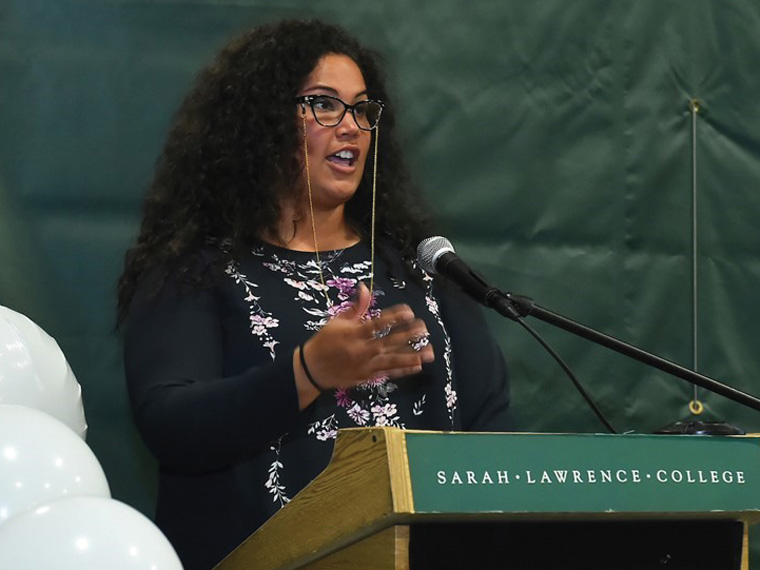
Kamaron McNair ’18 has been a resident adviser since fall 2015 and served as vice chair of the Undergraduate Student Senate for two years. She’s also captain of the Gryphons softball team and led the 2016–17 Student-Athlete Advisory Committee as president. This summer, she participated in the Community Leadership Intern Program, working at the Hudson River Museum.
“A leader is someone who’s willing to take charge and take responsibility—for their own actions and things that are bigger than them.”
Kamaron’s Thoughts on Leadership
A leader is someone who’s willing to take charge and take responsibility—for their own actions and things that are bigger than them. A leader is mature, helps teach and guide, and sometimes delegates and mediates. Good leaders don’t point fingers or disclaim responsibility. They say: “I’m trying to encourage people to do well. I’m trying to be a role model.” On a global scale, a leader should be aware that people making decisions are looking to them.
As captain of the softball team, the coach will ask me, “Why is this person not doing well today?” I first thought, “Why are they asking me?!” But now I realize that I’m responsible for all the links in the chain, that it’s the leader’s responsibility to know where the weakest link is and take steps to rectify it. Everyone might have to work together to make it right, but the leader has to get them there. A leader can’t control everyone, but must be aware of everyone. And they have to hold the team or group together.
I was thinking about why we all regard Abraham Lincoln as such a great leader, regardless of our political affiliation. I realized it’s because our country was at a point of division, and he held us together. He said: “We work better together. I know we have these huge differences, but we’re not going to fix that by saying, ‘Okay, you can leave.’” That applies to everyday life. A leader has to say: “Not everybody’s going to be happy, but we will get this to work for everyone. The team will still exist.”
My mom has always been a role model for me. My father passed away when I was 12, and my mom was able to step up and hold my family together. She became a full-time working mother, and, though she didn’t go to college herself, she figured out how to help me and my siblings continue our education. I grew up knowing that I was missing a big part of my life—my dad—but I knew we would stay afloat because my mom taught me and my siblings that we had to stick together, regardless of our differences. Moms hate it when their kids fight, but it’s going to happen, and she always said, “We don’t have to get along, but we do have to survive.”
By contrast, the coach I had in middle school softball wasn’t an effective leader. I never saw him as an authority figure—maybe because I was a bratty 13-year-old or maybe because he never established himself that way. With all my other coaches, the expectation was set from day one that the coach is the authority; that’s how it has to function. He played favorites and never positioned himself as a figure to be respected. There was no leadership, no learning.
The strong leaders in my life have all said, “Okay, you’re going to be in charge of this now—not because I don’t want to do it, but because you have to learn.” That’s how I became a leader over time. That’s why I delegate and try to find others’ strengths—and recognize my own weaknesses. You don’t have to like me, but if I’ve been chosen or elected as the person in charge, you have to respect that. My mom taught us that you’re allowed to question authority as long as you do it respectfully. Someone can always come to me and say, “I have an idea,” or “Could we try this?” and I’ll always hear them out. But if they just say, “You’re doing a bad job,” that won’t get them very far.
